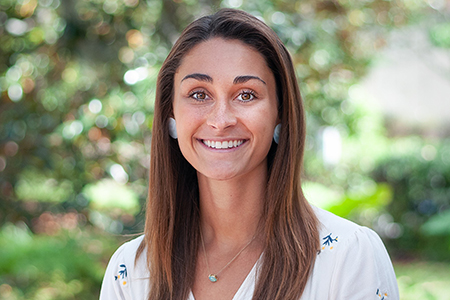Cecilia Bouaichi

"You’re pushed to your true potential."
College: Arts and Sciences
Degree Program: Neuroscience
Degree: Doctorate
Why FSU?
When I came to the university to interview in February 2018, I fell in love with the campus and the Florida climate. The sense of collaboration and competitiveness among labs was perceived as encouraging and inviting, rather than the cut-throat atmosphere among graduate students that is present at other universities. This sense of cooperation and support was one of the most attractive things about the program in my opinion.
Motivation to pursue a graduate degree
I worked at Eli Lilly & Company, a major pharmaceutical company, for a little over a year following graduation from my undergraduate university. I would run the same experiments daily without giving much thought to the eventual impact of my work. This job became mundane, and I yearned for a sense of purpose in what I was researching, leading to my application to FSU.
Importance and impact of research
My research is aimed at investigating how gustatory solutions modulate taste-related activity in the gustatory cortex of mice and shape taste behavior. Over the past decades, many studies have investigated the neural representation of gustatory stimuli in the gustatory cortex of alert rats; however, in recent years there has been an increase in taste neurophysiology and behavior work in mice, an animal model that offers easier access to genetic tools to manipulate and visualize neuronal activity. Despite the significance of this more recent research, several key issues concerning the processing of taste information in the mouse gustatory cortex remain unaddressed.
Unraveling how the brain integrates sensory information in order to influence behavior is crucial to better understanding basic taste neuroscience, especially during a time when overnutrition and resulting obesity and metabolic diseases are so prevalent.
Advice for prospective graduate students
DO NOT compare yourself to others. Coming into graduate school, I thought there was a specific timeline of when I should have my first publication, receive outside funding, or other accomplishments. This is far from the truth. Everyone's research is different, and everyone has their own timeline. Only compare your current self to your past self, and strive for growth.
Accomplishments during graduate career
Thanks to Dr. Vincis's constant mentoring, help, and support, the work performed during my first year in the lab was compiled in a manuscript that has since been published in the Journal of Neurophysiology. This was my first, first-authored publication, and I was very eager to present a poster at the International Symposium on Olfaction and Taste conference in Portland, Oregon, last summer. Unfortunately, the conference was virtual due to Covid-19, but it was still a wonderful experience to have our lab’s research presented at such a well-attended conference specifically aimed at researchers in the chemical senses.
This semester, I am thankful to have been awarded the NIH Chemosensory Training Program Fellowship, allowing me to focus my efforts solely on my research.
Publication: Bouaichi, C.G., and Vincis, R. (2020). "Cortical processing of chemosensory and hedonic features of taste in active licking mice." J Neurophysiol.
Poster: Bouaichi, C. and Vincis, R. “Cortical processing of chemosensory and hedonic features of taste in active licking mice.” International Symposium on Olfaction and Taste (ISOT). Convenes every four years, 2020. Virtual meeting (due to Covid-19). 3-7 August 2020.
Career aspirations
After earning my degree, I hope to pursue a career in drug discovery at a major pharmaceutical company, leading my own team of scientists, or continue my research in the taste field in academia.
